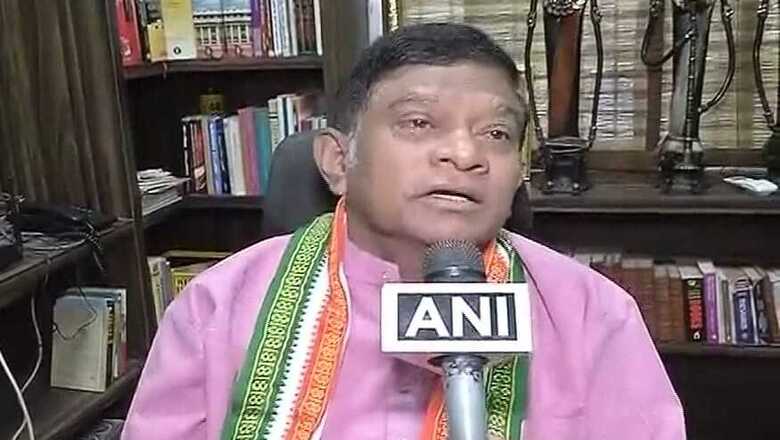
views
The vote difference between the BJP and Congress in the 2013 Assembly polls in Chhattisgarh was a mere 0.7%. Of the seats won by the BJP, 13 had margins less than 5,000 votes, whereas only four Congress candidates won by such small margins. The final scorecard in the 90-member Assembly was BJP 49 and Congress 39.
Back then, the unanimous conclusion was that Ajit Jogi’s presence dampened Congress prospects in the elections.
Chhattisgarh was carved out of Madhya Pradesh in 2000. The demography of the newly created state compelled the Congress leadership to appoint a non-Upper Caste chief minister. The new state had 32% tribal and 12% Dalit population. But the largest chunk of the electorate was the Backward Classes constituting almost 45% of the total population. Upper Caste and other communities constituted approximately 10-12% of the residents.
Ajit Jogi, ex-IAS officer who joined the Congress in 1980s and was considered close to the Gandhis, positioned himself as a tribal leader and became the chief minister of the state. Jogi’s tribal status later snowballed into a big controversy. Jogi being a polarising personality, the Congress suffered a setback in the first elections to the state Assembly in 2003. The party registered major losses in tribal-dominated Sarguja and Bastar divisions.
Jogi had his core constituency in Dalit-Satnami population in central Chhattisgarh. Since the state's Scheduled Caste population is mostly confined in the plains of Mahanadi, the effective percentage of SCs in any Assembly in this area is 20 to 30% in many seats. But Jogi’s brand of politics also drove away a large section of OBCs and Upper Castes from the Congress. The BJP, being the main opposition party, was the natural beneficiary.
But the 2009 Lok Sabha election defeat suffered by Ajit Jogi’s wife Renu at the hands of BJP leader Dilip Singh Judeo from Bilaspur broke the myth surrounding Jogi’s indispensability for the Congress.
In May 2013, the Congress suffered a massive jolt when several of its top state leaders were killed in a Maoist ambush in Bastar. It is said that the Congress leadership even thought about expelling Jogi in 2013. But the then state leadership could not bite that bullet.
The Assembly election results of 2013 shattered the myth of Jogi's hold on the state as some of his close associates lost. Besides, nine out of 10 Scheduled Caste seats were won by the BJP.
It was at this juncture that the Congress decided to appoint new presidents in all four states it lost then — Delhi, Rajasthan, Madhya Pradesh and Chhattisgarh. Bhupesh Baghel, a four-time MLA and considered to be a strong leader with farmer and OBC background, got the opportunity in Chhattisgarh.
The Congress suffered yet another embarrassment in the state when its candidate for the Antagarh assembly bypoll in 2014 withdrew at the last minute. A purported sting operation pointed fingers at Jogi’s son, underscoring allegations of BJP-Ajit Jogi nexus in the state.
At this point, the state unit president Bhupesh Baghel gave his assent to the central leadership for Jogi’s ouster. In January 2016, Ajit Jogi’s son Amit was expelled from the party. This forced Ajit Jogi to leave as well and float his own regional outfit.
The party had its task cut out — compensate the possible loss of voters, especially Dalits, and that of cadres in the Mahanadi plains. The only area from where the loss could have been compensated was from OBC and the Upper Caste.
In last two years, the Congress has challenged the Raman Singh government on key issue concerning farmers, land acquisition and the forest rights bill. Baghel left no opportunity to attack Raman Singh. The BJP countered his attacks with cases against him and his family members.
In the last leg of the election, the Congress decided to go alone in Chhattisgarh despite talks of an alliance with Mayawati’s BSP. Mayawati later joined hands with Ajit Jogi's Janata Congress Chhattisgarh Jogi (JJCJ).
Going solo in Chhattisgarh was a calculated risk the Congress took. The Mayawati-Jogi alliance had the potential to affect Congress’ prospects in Bilaspur, Mungeli, Janjgir and Baloda Bazar districts.
However, the benefit of going alone and allowing the JCCJ and BSP to ally, opened up the prospects of a straight fight with the BJP in at least 65 seats, of which the Congress ultimately won 55.
The Congress, without Jogi, is no longer an anathema for the OBCs and Upper Castes. The loss of SC votes was plentifully compensated by these communities.
Raman Singh remained the choice of the voters only till the time Jogi was in the Congress. With him out, voters could make a different choice and that’s precisely what they did in the recent elections.
The BSP rose from 4.6% vote share to 10.5% after joining hangs with the JCCJ. This should have pulled the Congress down below 35% from the 40% vote share last time. The grand old party instead netted 45% vote share. The BJP ended up falling from 41% to 33%.
(The author is a lawyer and a political observer. Views expressed are personal.)



















Comments
0 comment